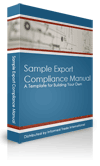H.R. 5828 Would Significantly Change the Current AES Environment
On April 17, 2008, new legislation was introduced in the House of Representatives (“Securing Exports Through Coordination and Technology Act,” H.R. 5828) by Representatives Don Mazullo (R-IL) and Adam Smith (D-WA). This bill, which is intended to “enhance the reliability of information in the Automated Export System,” would significantly change the current AES filing environment. In his press release dated April 17, 2008, Representative Mazullo noted that the bill would modernize the AES to prevent freight forwarders and exporters from “inadvertently making illegal exports to restricted parties or embargoed countries,” and would bring about a dramatic reduction in “avoidable errors and associated fines assessed to small exporters.” Specifically, H.R. 5828 would:
- Require mandatory AES filing of Shipper’s Export Declarations (“SEDs”);
- Establish a system in which the Census Bureau would grant licenses to individuals (i.e., U.S. citizens and U.S. permanent residents) and corporations to file information via AES-such a licensing system may include a review of the applicant’s fitness and character, written examination, and participation in a periodic continuing education program;
- Implement a process in which AES licenses would be denied, suspended or revoked if the Census Bureau has reason to believe that an applicant or licensee has violated or will violate U.S. export laws and regulations;
- Require AES to perform export screening, and issue Fatal Error notices to filers if “hits” are identified on the various restricted parties lists and there is no related export authorization;
- Ensure that AES would issue automatic notifications of potential export license requirements under the Export Administration Regulations (EAR) or International Traffic in Arms Regulations (ITAR) for codes (i.e., HTSUS or other codes) that are entered by the filer;
- Require AES to issue “compliance alerts” to filers when: (1) the HTSUS code is inconsistent with the Export Control Classification Number (ECCN) or U.S. Munitions List category; (2) the use of a license exception under the EAR is not applicable to the country of ultimate destination, intermediate consignee, or ultimate consignee; or, (3) the filer has not specified a license number or license exemption for a commodity that is covered by a U.S. Munitions List category; and,
- Exempt AES filings from public disclosure; however, the Census Bureau may share confidential AES data with: (1) other U.S. federal government agencies; and, (2) certain foreign governments on a case-by-case basis in order to enforce U.S. export laws, combat terrorism, and combat the proliferation of weapons of mass destruction.
It is interesting to note that the data elements that the bill requires AES to capture (i.e., identification of parties to the transaction, commodity classification, license authorization, certification by filer) are currently mandated by AES, in addition to the value and quantity of the commodities, commodity weights, and identification of whether the goods are of foreign or domestic origin. In addition, the bill’s requirement that AES issue compliance alerts to filers when the entered HTSUS code is inconsistent with ECCNs or USML categories is curious, given the fact that there is no correlation between the HTSUS, the Commerce Control List, and the U.S. Munitions List.
Another point of interest is the fact that the bill’s provision relating to the potential sharing of confidential AES data with certain foreign governments appears to be the same disputed issue that has delayed the Census Bureau’s issuance of its final rule on mandatory AES filing. See “Foreign Trade Regulations: Mandatory Automated Export System Filing for All Shipments Requiring Shipper’s Export Declaration Information,” 70 Federal Register 2005 (February 17, 2005). As the Federal Register notice’s title suggests, the pending Foreign Trade Regulations mandate AES filing of SEDs. Further, in its Federal Register notice dated October 22, 2003, the Census Bureau stated that it had previously considered the establishment of an “AES Filer Licensing and Permit Program”; however, the agency opted not to move forward with the plan for the time being. See 68 Federal Register 60301 (October 22, 2003).
Finally, as noted above, the bill requires AES to perform basic export screening of transactions, and to reject filings that appear to involve an individual or entity designated on the various restricted parties lists. Accordingly, any future regulations to implement this provision would hopefully address such issues as Option 4 AES filings (in which AES filings are transmitted post-shipment for approved exporters), as well as the expedited handling and resolution of “false hits” against the restricted parties lists.
H.R. 5828 was referred to the House Committee on Foreign Affairs on April 17, 2008.
Contributed by:
Melissa A. Miller Proctor, Attorney
Sandler, Travis & Rosenberg and Glad & Ferguson, P.C.
www.strtrade.com
Posted on May 1st, 2008 by keeton
Filed under: EAR, ITAR

